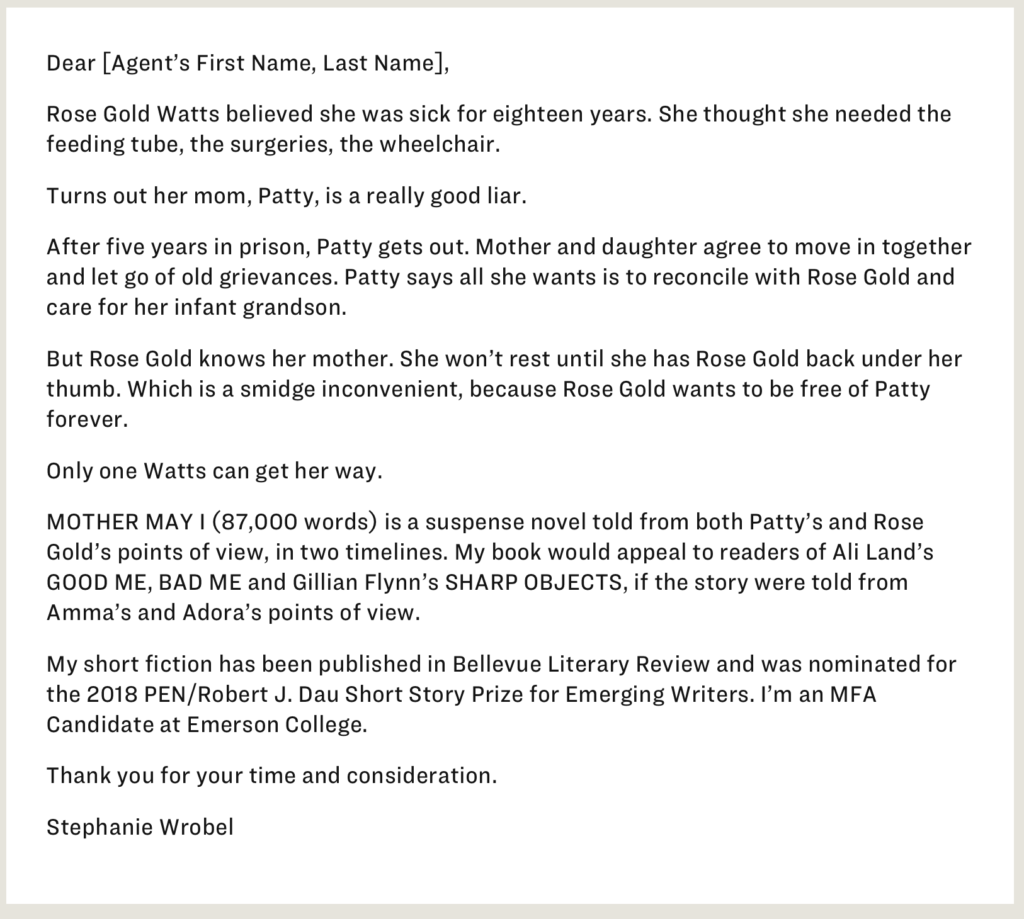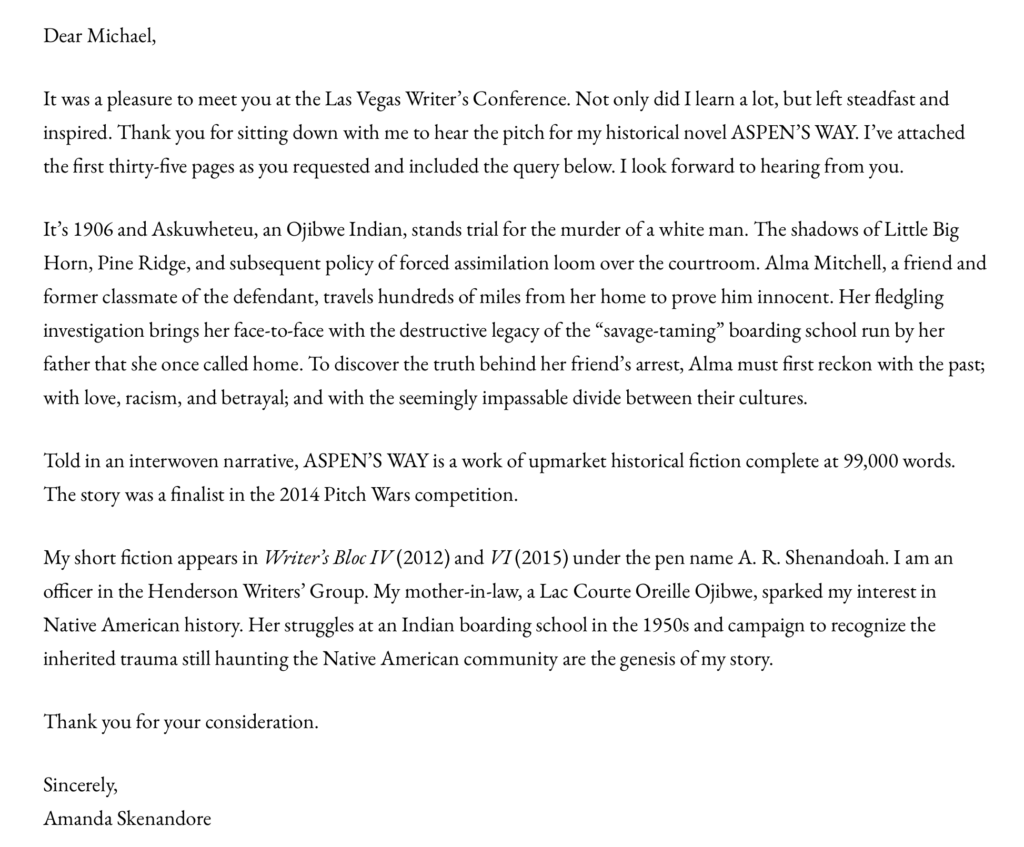A cover letter for your book is one of the most important parts of the publishing process if you want to pursue the traditional publishing route. The first thing agents and publishers will see when they open your submission packet is your cover letter. The cover letter for your book is the best chance you have at making a good impression and getting agents and editors to read your work!
While cover letters are generally a requirement in hybrid or traditional publishing, knowing how to write one is a useful skill regardless of the type of publication you pursue. Intimidated by the idea of writing a cover letter for your book? We’re here to help! Read on for some great tips on how to write a cover letter that is sure to grab the attention of agents and publishers.
What is a cover letter?
A cover letter introduces your book and you to potential agents and publishers. Because this is often your first point of contact, it’s important to know how to write a proper cover letter for your book. In traditional publishing, this is particularly crucial as you have a very limited chance to make an impression on agents—most of whom receive dozens of cover letters every day.
However, keep in mind that not every submission packet is created equal. While it’s a good idea to follow the same basic structure when writing the cover letter for your book, the rest of the submission packet can vary. Typically, agents will also want to see the first three chapters/10,000 words of your novel along with a one-page synopsis, but this can vary from agent to agent. Make sure you do your research beforehand on the individual submission guidelines of any agent or publisher you plan to pitch to.

What should you include in your cover letter?
- An elevator pitch. This is a brief summary of your book. The basic concept is that your pitch should be short enough that it can be told to someone during a quick elevator ride.
- Information about your novel. This should include the word count, your book’s genre, and the target audience.
- One paragraph about your novel. This is much more detailed than your elevator pitch, but less detailed than the synopsis. In this portion of your book’s cover letter, you should introduce the main character, describe the inciting incident, the main obstacles/antagonists to your character’s goals, and how your main character might go about tackling them.
- One of the best ways to show that you know your target audience is by including at least two comparison titles in the cover letter for your book. Look at books that have been published in the past two to three years and find a few that feature similar themes to yours. For example, readers who enjoyed Gone Girl might also like The Girl on the Train and The Woman in the Window.
- A one to two sentence sign-off describing any attachments and how the agent can get in touch.
The Dos and Don’ts of writing a cover letter
Depending on the size of the agency, agents can receive anywhere from 50 to 300 query letters every week. So, while it is important to keep the cover letter for your book professional, you also need to stand out from the crowd.
Keep your cover letter short
The ideal cover letter is one page long, usually between 250-300 words. With so many queries in their inboxes, agents and publishers simply don’t have the time to read lengthy letters. Anything longer than a page is likely to be pushed aside. This also means you only have a short time to grab their attention, so don’t waste it!
Share personal details about your life…if they’re relevant.
This includes any previous encounters with the agent, any awards/shortlistings for your book, etc. If a personal detail is relevant to your story, including it in the cover letter for your book is a great way to connect you to your work.
For example, if you’ve written a mountain climbing adventure novel and you’re a mountaineer, include that. Or, if you feature foreign words in your novel and spent several years in a country where that language is spoken and your book is set, this is something you can include in your cover letter as well.
At the same time, avoid irrelevant details in the cover letter for your book. Even if you are the best mountaineer in the world, if your book is a time-traveling romance with no mountains in sight, you shouldn’t include this detail. It will just bog your cover letter down.

Show confidence in your work
One area where you can show confidence is with the comparison titles. Follow them up with a short sentence about why you think your work will appeal to the same readers. Bonus points if you compare your writing to something published in the last year or an author represented by the same agency the agent works for!
However, be careful not to come across as arrogant. Avoid long-winded explanations about why there is a huge market for your book, or why you are the next Stephen King. This is akin to telling the agent how to do their job. Instead, your writing should speak for itself. Even if you think it’s true, the editor will roll their eyes and possibly not give your sample writing the chance it deserves.
Research the agents you contact
Avoid sending your manuscript to every agent you find. The agent should not just represent your genre and have expressed an interest in your type of book, but they should also have represented authors who have published in the last two years.
Many agents list the authors/books they represent on their website, so get scrolling. Sites like Manuscript Wish List are also great tools for finding out what types of books agents are looking for in real time.
Be very careful about email etiquette when approaching agents and publishers. Make sure you spell their name correctly and use the titles they prefer (you can find this information on their website or social media pages). Don’t use vague greetings like: Dear Sir/Madam or To Whom It May Concern.

Take your time
- It can be tempting to start sending out submissions immediately after finishing your novel. However, it’s important to do several rounds of edits on your book before you pitch it to agents and publishers. If you pitch your book too soon, it might not be ready, and you risk rejection. Increase your book’s chances at success by thoroughly editing it first. Hiring a professional book editor is a great way to make sure your book is polished to a professional standard.
- Like your novel, your cover letter should have a good flow to it. Read it out loud. Make sure your enthusiasm and voice come through in your cover letter. Make sure you can sense your unique personality.
- Just like you’ll need to edit your book multiple times before submission, your cover letter also needs to undergo several rounds of edits before it’s ready. After you’ve written it, when you’re tempted to hit send, stop, and come back to it tomorrow. You’ll be amazed how many typos you catch by waiting 24 hours.
Take your time with the cover letter for your book. It’s the first thing agents and publishers will read from you, and usually, the cover letter is the deciding factor in whether they’ll want to read the sample chapters of your book. That’s a lot of pressure on one little letter!
And if you feel you need a little more help—whether it’s to polish up the cover letter for your book or figure out which agents to submit to—The Open Book Editor’s author services provide excellent support for the entire submission process.
Some example cover letters by (now-)famous authors
If you’re still not sure where to begin, here are a few examples of successful cover letters:
Darling Rose Gold by Stephanie Wrobel (psychological thriller)

Between Earth and Sky by Amanda Skenandore (historical fiction)

Here are a few resources for sourcing literary agents who represent your genre:
https://querytracker.net/ – requires a subscription
https://www.publishersmarketplace.com/ – requires a subscription
https://www.writersandartists.co.uk/ – paperback can be purchased via Amazon or in most bookshops
Last minute submission tips:
- A good way to seek out agents who might be interested in your book is by looking at popular books in the same genre that have been published in the last year. Google the authors to find out who represents them and if their agents are currently accepting submissions.
- Start with a list of around 10 or so agents. You don’t want to contact too many at a time in case you later decide you think you need to change your strategy. Don’t rush. It’s best to take your time and get it right; agents don’t like it if you contact them multiple times in quick succession.
- Be open to changing your approach. This might mean anything from rewriting the cover letter for your book to taking part in online writing competitions like #PitMad to catch agents’ attention. The submission process is a marathon, not a sprint, so be open to making changes as you go along.
Above all, remember that writing a cover letter is an art, not a science! There’s a reason why there are so many different pieces of advice out there for what makes the ‘perfect’ cover letter. As long as you lay a strong foundation to work with and follow these basic rules, you’ll be able to create a rock-solid cover letter for your book that is unique and sure to get that attention it deserves.


